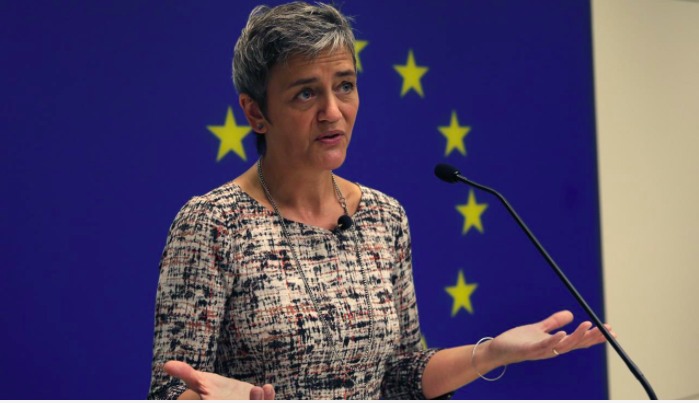In Margrethe Vestager the left has a new leader, but nobody in Italy noticed
Read the original article in Italian here

Pierluigi Bersani and Massimo D’alema haven’t invited her to their conventions, Giuseppe Civati hasn’t yet put her in the “Possibile” pantheon, Giuliano Pisapia has yet to cite her as a European Leader to imitate. Nevertheless, Danish Margrethe Vestager understood what the left has to be (and do) in the third millennia. And nobody in Italy noticed.
In November 2014, the leader of the Danish “radical left” party (Radikale Venstre) has become European Commissioner for Competition. She decided since the beginning to enforce the rules of the common European market. Starbucks, Fiat, Android, Google and Gazprom. Vestager has deeply looked into and in many cases sanctioned the unfair behavior of the corporations. From tech to transport. In 2016, the Commissioner has asked Apple to deposit 13 billion Euros to the Irish government for having enjoyed illegal state aids for 25 years. An unthinkable move up until that time for the size and political courage demonstrated. In June of this year, she achieved in making Google pay a fine of 2,42 billion Euros for abusing their dominant position in the search engine market. We are talking of the highest fine ever given by the European Union.
The last corporation to end up in her aim is Amazon. Jeff Bezos’ company will have to pay 250 million Euros in taxes to Luxembourg for having enjoyed an agreement with the government believed to be illegal.
Vestager has a very defined political strategy. Get the EU closer to the citizens, even with resounding gestures and make them feel protected: “We are doing this because people are angry about tax avoidance. In Europe you can’t tell people the detail of what you do. You have to tell them the bigger story”.
Daughter of two Lutheran pastors grew up in Ølgod, a small town in the Danish countryside. Politico defined her as “radicool” for her ability to update the political lingo of the left. Despite the name, Vestager’s “radical left” party seats with the ALDE group in European Parliament.
Centrist? Not at all. Vestager is the only one that has understood where does the real social conflict lie: with those who evade taxes and the cartels that hinder the redistribution of wealth. She took the rage and the ideas of the No Global movement and offered a concrete political answer: “If our ideas are never challenged, they’ll never get any better. We end up stuck with ideas that once served us well but haven’t kept up with changes in our world and our societies” she said one week ago in a meeting organized by the American Entreprise Institute.
While the member states struggle to find an agreement on how to uniformly tax multinational corporation with the European web tax, she has worked with the little power offered by the treaties and gained political gold. With her, the commission has become some kind of soviet against the monopoly of corporations. A Robin Hood that steals, or rather takes back, money from the corporations and gives it back to taxpayers.
Verstager is the only politician of the European left with a concrete agenda to counter the populism of the eurosceptics. Accept capitalism, globalization and the role of multinational corporations instead of suffering it. Make them pay the right amount, with a steady hand, without exceptions. Above of all redistribute more than just the crumbles of what the market has left, like Blair’s and Clinton’s “third way”.
The Italian left, disappointed in Tsipras and fascinated by the far away and unrepeatable experience of the Portuguese Da Costa, ignores her. They prefer to yell against austerity measures and look at the early XX century left of Corbyn, which promises free universities (a normal behavior in Europe, UK is the exception here) and the nationalization of rail and post services. How to finance all that we will have to see, the important thing is to lull ourselves in the utopia. Up until a few decades ago, the radical left was pro Europe, now that the votes have gone away they look for them in the Eurosceptic crowd and bashing the eurocrats of Brussels.
Eurosceptics have a very clear objective: go back to nation states. How to use the new sovereignty in a globalized world though, all the leaders from left to right are drawing blanks. The recipe of the Italian left is to raise the debt (that future generation will pay, like we are paying the ’80 one), nationalize (again, with taxpayers money) and keep failed business alive.
Vestager is an ambitious politician. Minister of Education at age 30, leader of the party at 39, Finance and Economy minister and vice president of the party at 43 and now Commissioner at 46. Now she is aiming for the presidency of the Commission in 2019. The last request for 250 million to Amazon came right from the LuxLeaks and the tax regime involving multinational corporation when current president Jean-Claude Juncker was Prime Minister there.
In june 2019 we will have European Elections. Juncker already said he will not run for a second mandate. The collapse of the socialists and the rise of nationalistic parties could give us a European Parliament without a clear of S&D or EPP majority. In politics nothing is certain, nevertheless, the next president could be neither a “classic” socialist nor from the EPP. Vestager is an “atypical centrist” with an agenda through which the the left of the third millennia could take advantage of.
